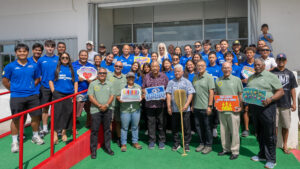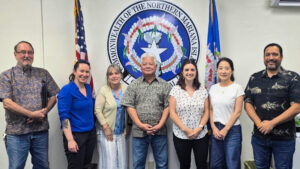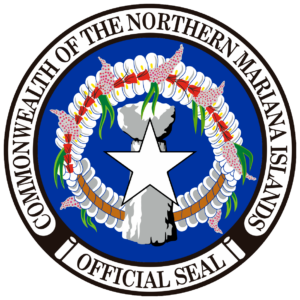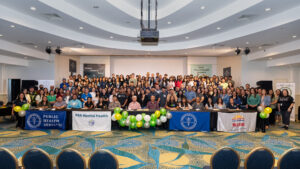WRITTEN TESTIMONY
Ralph DLG. Torres
Governor, Commonwealth of the Northern Mariana Islands
Before the 2022 Senior Plenary Meeting
of the Interagency Group on Insular Affairs (IGIA) February 1, 2022
Hafa Adai and Tirow from the Commonwealth of the Northern Mariana Islands (CNMI).
Thank you, Secretary Deb Haaland, Deputy Assistant Secretary Keone Nakoa, Director Julie Chavez Rodriquez, and Senior Advisor and Coordinator Mitch Landrieu, for inviting my written testimony on behalf of the people of the Commonwealth of the Northern Mariana Islands, so that we may participate in this worthwhile discussion. The complications of the COVID-19 pandemic have now evolved to the new task of managing and deploying the surge of resources provided by the federal government in response to these matters. I regret that I cannot be there in person, but I am grateful for the opportunity to contribute in this important discussion.
The ongoing pandemic has unprecedently impacted our way of life no matter where you live in the United States. This global crisis certainly did not discriminate by border or geography, as its extent continues to influence even the most basic decisions we make on a daily basis. The nature of this present crisis, however, is different for the CNMI in many ways. This is because the secondary impacts of the crisis and the implications of our necessary responses to mitigate the spread has levied a disproportionate burden on small, tourism-focused economies like ours. Our economy relies almost exclusively on international travel and tourism. As a result of the pandemic, the Commonwealth’s sole economic driver is halted in its tracks once again, and has left the CNMI teetering over the edge of another economic depression.
The loss of the CNMI’s tourism market and the inability and unwillingness of tourists to enter our borders due to outbreak-related influences has devastated thousands in our labor force, hundreds of businesses, and many others that rely on government services. Nevertheless, we are grateful for the opportunities to recover from the impacts of this pandemic through the passage of the American Rescue Plan Act (ARPA) and the flexibility we were allowed to respond to the challenges unique to the CNMI.
We are hard at work to mobilize these resources in order to see a resumption in commercial activity and the improvement of lives across the Commonwealth. Already through ARPA funding, we have successfully launched the region’s first travel bubble agreement with South Korea, partially resuming this critical tourism market for our community; but the work continues. We endure forward in supporting our recovery efforts with a keen eye toward accountability and compliance with all federal guidelines.
And while the nation takes historic steps toward rebuilding our country’s infrastructure through the Infrastructure Investment and Jobs Act and the proposed Build Back Better Initiative, it is imperative that the CNMI address the unique infrastructure issues related to its development. Like most of the U.S., our infrastructure directly affects the lives of our residents, our economic development, and our environment. Unfortunately, the CNMI’s infrastructure is in a critical state due to decades of pre-Commonwealth neglect, lack of infrastructural advancement, extreme natural and weather-related challenges, and an absence of sufficient funding sources.
As the newest member of the U.S. political family charged with the complete modernization of a pre-World War II infrastructure, creating a solid and reliable infrastructure system continues to be one of our greatest obstacles. At the inception of the Commonwealth, the new government found itself confronted with decades old and degraded roads, water, and power distribution infrastructures and environmentally hazardous wastewater and landfill conditions. Wastewater and road drainage systems were largely nonexistent. Air and sea ports, schools, hospitals, and other public facilities were also in significantly substandard states. Since then, we have made great progress in transforming our road systems, power grids, water and sewage systems, landfills, air and sea port developments, and public transportation. Still, we have not had the funding resources necessary to address the breadth of our infrastructural needs, and certainly not in a planned holistic, sustainable, and resilient way.
Beyond achieving equitable standards of living for the people of the CNMI, infrastructure developments have the potential to support greater resilience of our economy if considerable recognition is given to our unique challenges. Consideration of these impediments must be given fair weight in order to effectively ensure that federal resources provided to the CNMI achieve positive outcomes. These challenges include but are not limited to the following: 1) our remoteness from the rest of the United States, 2) political borders that impact our limited workforce, 3) climate change issues, 4) our geographical limitations in land mass, and 5) our separation of lands by ocean.
The CNMI’s distance from the mainland United States precludes access to workers and exacerbates the costs of transportation for both the people and supplies necessary to rebuild an infrastructure largely developed in the middle of the 20th century. Inflating costs for labor and transportation mean that any development and recovery we are seeking to realize in the CNMI will be more expensive and require greater efforts than those in the mainland because of our geographic location and federal regulations governing air and sea transportation to the islands. This harsh reality is one we must face head on as we attempt to bring our island territory into the 21st century.
Further, as indicated in the recent CNMI Economic Census, produced by the U.S. Census Bureau, the CNMI had 2,803 individuals employed in the Constructions Trades. By way of demonstrating the severe limitations this has on our ability to undertake large-scale and essential developments, one project alone, the Tinian Divert Airfield construction by the U.S. Airforce, has the potential to require as much as 2,099 construction workers for the development of this critical infrastructure project for the United States armed forces.
Reliable labor has been a longstanding and significant problem for the Commonwealth. The fact remains that for public infrastructure developments and private investments alike, the CNMI just does not have the sufficient skilled-workforce to complete the range of projects necessary to support our recovery and growth. This is because we are hampered by the prohibition on CW-1 construction workers under U.S. Public Law 115-218. Although we have made great strides to train and hire U.S. workers, few options exist to ensure that our projects have the essential manpower to be completed, especially considering the fact that the mainland United States is experiencing labor shortfalls of its own despite its immense labor force and means. Even with the deployment of federal funds into the CNMI, our labor constraints make it difficult for projects to be completed, and are additionally burdensome when these projects are tied to federally-mandated timelines.
We cannot emphasize enough that for the CNMI, access to labor is at the forefront of many of our development issues. We cannot build enough scale within our community to lower the costs of living, increase the efficiency of government services, or support those in greatest need – our retirees, our students, our mentally ill and people with disabilities, without a sufficiently robust economy, and this economy cannot exist without workers and tourists.
We have been working toward the resumption of arrivals to provide the essential external resources for the many businesses and employees that support and rely on the tourism sector. Although I am proud of these successes, the tourism economy globally will take considerable time to recover. This is of significant concern for the CNMI because as federal resources reach their expiry date, the CNMI will have no alternative means to support economic activity.
In the meantime, addressing our need to rehabilitate our outdated airports and seaports will allow us to compete in the regional tourism market. As with other island nations whose economies rely on a tourism market, the global pandemic has affected our airports and seaports’ abilities to forecast visitor arrivals, manage airlines ceasing operations, and conduct personnel trainings due to cost-cutting measures. Furthermore, securing the significant investments necessary to ensure the safe, timely, and reliable transportation of residents and cargo between the islands that comprise of the Commonwealth will lead to much-needed advancements in infrastructure, especially as the increase of demand continues in support of ongoing developments nationwide.
The CNMI would greatly benefit from the expansion of its broadband access as these opportunities to engage in investments will not be hindered by our land and labor limitations. A stronger connectivity with the world can leverage our geographic location to promote a range of internet- based enterprises that can provide a necessary buffer against the volatile international tourism market. Greater direct support to the technological infrastructure of the CNMI can also bolster American presence in the region, and provide higher paying jobs. Regrettably, it is difficult to entice competition outside the incumbent providers due to the CNMI’s unique location. In addition, there will likely be a need to improve government regulations and oversight to enforce affordability, reliability, and capacity of existing and new broadband infrastructure.
As many of you are aware, in recent years, the infrastructure of our three major islands were devastated by the effects of super-typhoons Soudelor (2015) and Yutu (2018). These Category 4 storms demolished our power grids, damaged or completely destroyed public facilities including our airports and most of our schools, and adversely affected our newly launched public transportation service. After experiencing two 100-year super typhoons within a three-year period, the CNMI worked to develop comprehensive planning strategies following the “Smart, Safe Growth” framework that form the intersection of three key areas of practice – hazard mitigation, climate impact adaptation, and smart growth; each of which follow their own policy guidance and best practices. The Infrastructure Investment and Jobs Act will allow the CNMI to invest in critical infrastructure and address resource needs to ensure that our communities can grow while withstanding current and future weather and climate related challenges with minimal physical damage or disruption to communities.
Regarding the CNMI’s utility projects, there is a need for sufficient funding for improvements to address the significant costs of pipe replacements for aged pipes; the implementation of a computer management and maintenance system (CMMS); the implementation of Supervisory Control and Data Acquisition (SCADA) systems; and the treatment/removal of contaminants such as PFOA/PFOS in the groundwater.
Moreover, the CNMI’s current water collection system and rates of ground-water production are not currently adequate for providing all residents with a potable water supply. To compensate for this, most of the islands’ residents and businesses supplement supply with site-built water catchment tanks and in cases standalone reverse osmosis systems. Approximately 90% of the CNMI’s water supply comes from over 200 shallow wells. The low land elevation of the islands and proximity to the sea level makes it difficult to recover fresh water. Sustained dry weather and the need to over-pump to provide an adequate supply directly affects water quality. Investments in our infrastructure must prioritize our residents’ need to access this most basic resource.
Further, as for wastewater, Saipan, our capital and the largest of the islands, has a wastewater management system that is supported by two wastewater treatment plants built between 1960 and 1985. These plants are severely in need of repair and replacement as age and weather conditions have deteriorated their efficacy and reliability to perform the critical task of treating the wastewater produced by the CNMI’s largest population center.
The conditions of infrastructure on the other two main islands of Tinian and Rota are more severe, as many critical infrastructural needs for any civilized society in the 21st century do not exist. On both Tinian and Rota, the populations do not have an integrated wastewater system or a wastewater treatment facility. Much of the wastewater is managed by septic systems in a decentralized management system which bring risk to the safety of the underground aquifers. In addition, neither Tinian nor Rota have EPA-approved landfill sites and present solid waste is managed by surface waste dumps.
With regard to our highway needs, many of the CNMI’s roads are in substandard condition and in need of paving or repaving. We are excited for the prospect of investing in better accommodations for traditional vehicle transportation, and the potential to integrate “complete street” designs that incorporate bike lanes, sidewalks, and appropriate lighting and landscaping. Such a redesign and reenvisioning of our roadways that take into account a variety of forms of transportation will better serve our community and visitors and can facilitate numerous sustainability objectives including reducing our carbon footprint. This would also provide us with the opportunity to address underlying issues regarding drainage and runoff that significantly damage our marine environment.
My priorities on infrastructure development, destination enhancement, the diversification of our economy, natural disaster preparation and recovery, the mitigation of the ongoing global pandemic, and the improvements to core governmental services would be meaningless without the willingness of the federal government to understand our unique setbacks and provide avenues for us to address federal policy constraints that hinder our growth.
We must recognize that while the nation is suffering, the distinct challenges that have deterred progress for the territories in the last several decades have placed disproportionate impacts on our ability to succeed. This recognition and support will allow us to better provide our communities with the most essential of resources such as adequate and modern power generation; 24/7 palatable drinking water services; the implementation of a comprehensive waste management system; and accessible public transportation.
The CNMI’s challenges are indeed severe and many, but we are proud Americans who firmly believe that equity and developmental advancements can be realized and achieved within the borders of this great nation.
I would like to extend my appreciation to the participants from OIA, the White House, and our federal partners who have been proactive in supporting the needs of our Commonwealth, and all those who have assisted us in our ongoing recovery efforts. While we have made great strides in our endeavor to combat the effects of this pandemic, there is still much to do. I look forward to continuing to build stronger partnerships with our federal government, sister states and fellow territories along the way.
On behalf of the Commonwealth of the Northern Mariana Islands, thank you, Si Yu’us Ma’ase, and Ghillisow for this opportunity to share in this discussion.
Sincerely,
/s/
RALPH DLG. TORRES






